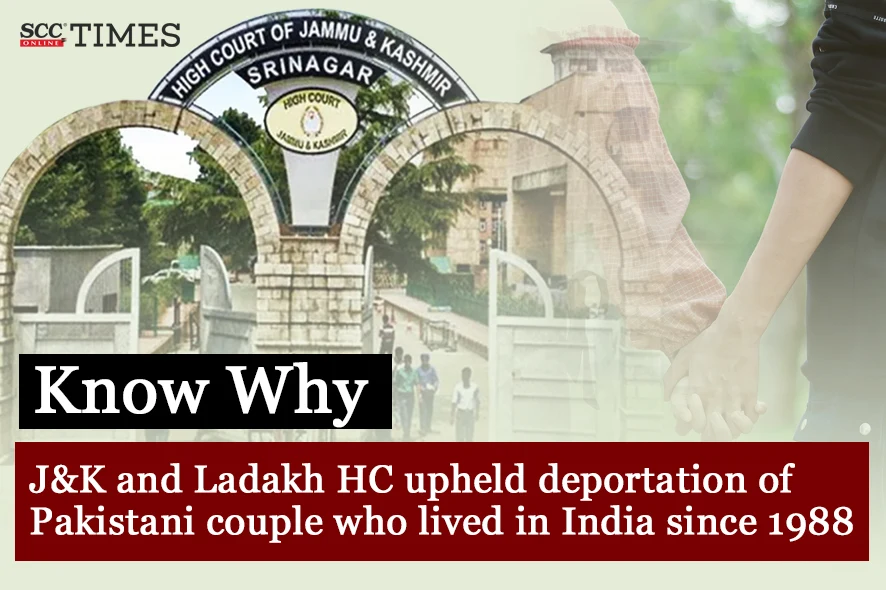Jammu and Kashmir and Ladakh High Court: The petitioners, husband and wife, who were Pakistani nationals, were living in Srinagar, India since 1988 on valid visa. But in 1989, the Home Department issued a deportation order which was challenged by them through the present petition. A Single Judge Bench of Sindhu Sharma, J., opined that the petitioners acted in their own volition and acquired citizenship of a foreign Country and further there was no evidence to support that their request for grant of Indian citizenship was accepted and therefore the deportation orders issued by the Government were valid.
Background:
Petitioner 1 was born in Srinagar in 1945 and belonged to a family of permanent residents and landholders of Jammu and Kashmir. During the partition of India, his father was doing business in Rawalpindi, Pakistan and due to the 1948 India-Pakistan war, Petitioner 1, then a four-year-old child, was stranded in Pakistan along with his family. It led to involuntary acquisition of Pakistani nationality due to compelling circumstances beyond his control.
Similarly, Petitioner 2 was born in Srinagar in 1962. Being a cousin of Petitioner 1, she married him in Rawalpindi in 1986. Following her marriage, she faced cruel treatment from her in-laws, and the couple was also deprived of the family business which made their life together highly insecure. Thus, the petitioners returned to Srinagar in July 1988 along with their minor son based on their Pakistani passports. They were issued residential permits by Respondent 1 and were granted three visa extensions of 30 days each valid up to 2-11-1988.
They again approached the respondents for further extension and simultaneously for the resumption of Indian citizenship relying on their permanent resident status and other equitable considerations. Respondent 1 referred the matter for grant of Indian citizenship to Respondent 2 and during its pendency an order of deportation came to be issued by the respondents against the petitioners.
The petitioners alleged that the respondents acted illegally, unlawfully, and in blatant disregard of the valuable legal rights of the petitioners to continue holding Indian citizenship, by proceeding to forcibly deport the petitioners from India to Pakistan. It was further contended that the action taken against them was arbitrary and violative of Article 14 of the Constitution, as well as the principles of natural justice, equity, and fair play.
The respondents submitted that the petitioners were neither permanent residents nor citizens of India and they had admitted in their writ petition that they had acquired citizenship of Pakistan resulting in the loss of all the rights and privileges applicable to the Indian citizens including property rights. It was stated by the respondents that the petitioners applying for Indian citizenship showed that they themselves were fully aware of their status as a non-citizen in India and knowingly entered the country using LOC entry permit as a citizen of Pakistan and hence the deportation order was not illegal.
Analysis:
The Court considered relevant legal provisions dealing with citizenship in Part II of the Constitution and under Sections 8, 9 and 10 of the Citizenship Act, 1955 (the ‘1955 Act’) and noted that the 1955 Act provided for acquisition of Indian citizenship which could be by birth, by descent, by registration, by naturalisation and by incorporation of territory. Whereas Section 9 provided for the termination of citizenship which stated that a citizen who voluntarily acquired the citizenship of another country after commencement of the 1955 Act or between 26-1-1950 and the date of commencement of the 1955 Act, upon such acquisition automatically ceased to be citizen of India.
The Court took note that Petitioner 1 ceased to be a citizen of India when he migrated to Pakistan and became a citizen there. Similarly, Petitioner 2 also voluntarily acquired the citizenship of Pakistan after her marriage and their son was a citizen of Pakistan by birth. Therefore, the Court observed that immediately upon acquiring the citizenship of Pakistan, they ceased to be citizens of India.
The petitioners had applied for the extension of their visa, which was rejected by the respondents, and the deportation order was issued. This deportation order was challenged by the petitioners and further a direction was sought to restrain the respondents from deporting them. The Court noted that the petitioners were staying in India after the deportation order was stayed by this Court vide order dated 25-4-1990. The Court relied on Izhar Ahmad Khan v. Union of India, 1962 SCC OnLine SC 1 and Union of India v. Pranav Srinivasan, 2024 SCC OnLine SC 2920, wherein it was held that there was no ambiguity about the effect of Section 9 of the 1955 Act. The voluntary acquisition by an Indian citizen of the citizenship of another country terminated his citizenship of India, provided the said voluntary acquisition took place between the 26-1-1950 and the commencement of the Act, or thereafter.
The Court opined that the petitioners acted in their own volition and acquired citizenship of a foreign Country. The passports and the residential permit issued to them were cogent, unequivocal evidence of the fact that the petitioners were not citizens of India. The Court further observed that there was nothing on record to suggest that their request for grant of Indian citizenship was accepted and finally dismissed the instant petition as it was without any merit.
[Mohd Khalil Qazi v. State (UT of J&K), 2025 SCC OnLine J&K 647, decided on 9-5-2025]
Advocates who appeared in this case :
For the Petitioners: Mohammad Altaf Khan, Advocate with Hashir Shafiq, Advocate
For the Respondents: Mohsin Qadiri, Sr. AAG with Maha Majeed, Assisting Counsel and T. M. Shamsi, DSGI with Sahila Nissar, Assisting Counsel.








